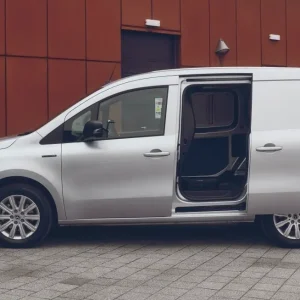
Despite tough economic conditions and the complexities of transitioning to electric power, optimism is not in short supply among UK LCV operators, according to the latest Arval Mobility Observatory (AMO).
The research, which covers businesses ranging from those with fewer than 10 employees to those with workforces at least 1,000 strong, found four out of 10 UK companies overall expect to grow their LCV fleets over the next three years, compared to just 26% overall in the European Union (EU). On the other hand, more UK businesses (14%) expect their fleet sizes to decline over the period than their EU counterparts (9%), with those with fewer than 10 employees the most pessimistic. Additionally, almost a third more EU than UK businesses expect fleet sizes to remain stable.
In the UK, small to mid-sized companies with fewer than 100 staff were the most optimistic, with half expecting to take on more LCVs.
Shaun Sadlier, head of AMO in the UK, said: “The smallest businesses might be more worried about fleet reduction simply because they are often more directly exposed to market forces and there are some signs of economic headwinds.
“Conversely, 50% of SMEs could be expecting growth based on opportunities that exist for nimble and dynamic companies of that size.”
Sadlier added the biggest reason for expected fleet growth – mentioned by 81% of respondents – was an anticipation of company expansion.
“Needing more vans is very much an indicator of economic optimism,” he said but cautioned that this optimism may not be realistic as it “contrasts with the largely flatlining UK economy”.
When it comes to looking for external advice, the AMO found most operators (58%) seek guidance for legislative and financial matters.
“These are areas where businesses literally cannot afford to make mistakes,” said Sadlier.
“Choosing a non-optimal acquisition method can be very costly, while getting compliance wrong can result in an injury to employees and prosecution resulting in fines and even imprisonment.”
A significant amount (36%) of respondents also sought technical and operational consultancy advice, with the largest businesses most likely to look for help in these areas.
“The numbers jumped up on the technical, operational side,” Sadlier observed.
“The process of electrification is likely to be the key driver here, with many fleets looking at resolving the perceived issues surrounding electric vans, including charging, range and payload,” he said.
When it comes to the costs of running LCVs, fleets of all sizes expect increases across the board over the next year, with most predicting hikes in service, maintenance and repair, leasing, tyres, insurance premiums and electric vehicle charging.
Surprisingly, SMEs and small businesses were found to be more likely to consider adopting hydrogen fuel cell vans than larger fleets, which, it might be assumed, would have better access to what is currently an extremely limited fuelling infrastructure.
Sadlier said this could be down to “wishful thinking” on the part of smaller fleets.
“It is possible bigger fleets are simply more aware of the operational difficulties surrounding hydrogen adoption and therefore are less interested in its potential as a solution,” he remarked.
More than 80% of fleets of all sizes stressed the importance of getting expert external advice about transitioning to electric vans.
“It’s no secret that while some operators have adopted electric vans with ease and found them a complete solution to their transport needs almost straightaway, others have had a much more difficult experience,” Sadlier said.
“Hurdles include not just range, payload and towing limitations but the whole life cost of vehicles and difficulties introducing overnight charging for drivers who do not have access to off-road parking to enable chargers to be installed.”
“Our role is to give information based on fleet [compilation] and usage,” he added.
The need for operators to be better informed about electrification was highlighted by the responses to a question about which vans and mileage profiles they had considered switching to BEVs, with a large number saying they would transition the vans covering the highest mileages. There were differences, however, according to fleet size: for companies with more than 1,000 employees 43% said they would switch compact vans covering more than 100 miles a day from diesel to electric followed by 35% opting for medium vans covering less than 100 miles. For companies with 100 to 999 staff, 43% said they would transition large vans with mileage in excess of 100 miles followed by 39% citing medium vans covering more than 100 miles a day.
Turning to SMEs, the highest percentage (48%) said they would change medium vans covering more than 100 miles daily to BEVs followed by 42% naming compact vans covering more than 100 miles a day. For companies with fewer than 10 staff, 37% said they would switch medium vans covering more than 100 miles a day to electric power followed by 31% opting for compact vans covering more than 100 miles.
Sadlier commented: “As fleets become more familiar with electric vans, it’ll be very interesting to see how this situation develops. Presumably, fleets will become increasingly familiar with their operational strengths, and learn to use them in an optimal manner.”
A question about actions taken to transition from diesel to electric vans elicited a more consistent, practical response, with 30% of fleets overall saying they used electric vans where a lower payload was possible, 28% designating BEVs to drivers who could complete their missions without needing a recharge and 25% saying they used BEVs in areas where charging is available.





